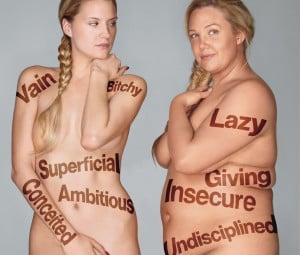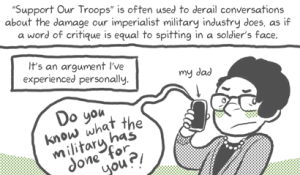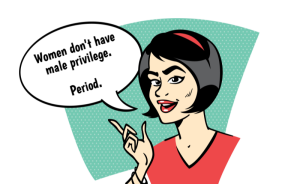I talk a lot about being a disabled person. I’m not shy about showing people what my life is like. I’m disabled, and though it’s a hard road, it’s one that has enriched my life.
But something that I haven’t talked about much over the last several months is the fact that I receive Supplemental Security Income (SSI) benefits. That’s because there’s a lot of problematic rhetoric out there around benefits, especially during election season.
Marco Rubio, Republican presidential candidate, recently said that some people on disability benefits are “cheating the system,” and used the example of his grandfather, disabled by polio, to imply that disabled people should simply work harder in order to be able to live fulfilling lives.
Unfortunately, though this attitude is most dangerous when being espoused by those in power — like presidential candidates – it’s not at all uncommon. If you are disabled, it’s expected that you “overcome” your limitations to achieve the same things as everyone else, and possibly more.
Once you have sufficiently achieved, you are lauded as “inspirational” for achieving, even though anything else would be considered lazy and a waste of valuable resources.
It’s this insidious fusion of classism and ableism that forces disabled people to conform to typical standards of achievement, and makes us feel guilty when we don’t.
So let’s unpack these problematic attitudes.
Here are some things you shouldn’t say to a disabled person on benefits – and why it’s so harmful.
1. ‘You’re So Lazy! Why Don’t You Just Get Up and Get a Job?’
Though on the surface, “getting a job” might sound easy, it’s not as easy as it sounds – especially for disabled people.
And yes, absolutely non-disabled marginalized people face barriers to employment. In fact, Gillian Anderson recently spoke out about being offered half the pay of her male co-star for the new X-Files revival. It’s clear that employment discrimination, both overt and covert, is a societal problem, rather than an individual one.
In this day and age, getting a job is tough for anyone – especially so for disabled people.
Let’s take my situation, for example. Primarily because of motor impairment, chronic fatigue, and pain from cerebral palsy, I cannot work most standard jobs.
It is unclear if I will ever be able to work full time. Even in the face of my privileges – I am a white woman who has fairly easy access to public transportation, living in the suburbs of one of the largest cities in the world – it’s still difficult for me.
I can only imagine the impossibility of getting a job for someone who doesn’t have my resources or accessibilities, though Rory Judah Blank does a great job talking about their experience in their article, “Capitalism, Racism, and Disableism: A Ménage à Trois that Fucks All of Us Over.”
Another example is my ex-boyfriend. He lived in a very rural area where the nearest public transportation was several miles away. His disability prevented him from driving and people used to tell him all the time to “just get a job” so he could save up enough money to move out on his own.
Yet, because of his lack of transportation, he couldn’t get to places to apply for jobs or go to interviews.
Even when he did finally get a job, his ability to move up in the company and get paid more was hampered by the fact that he couldn’t stay late or come in early, because he was limited to when paratransit (door-to-door transportation for people with disabilities) could get him there.
These are just some of the conditions that prevent disabled people from having high-paying jobs.
Contrary to popular misconceptions, some people who are on benefits do work and their income is taken into account by Social Security. In my case, I work as a freelance writer and mainly get paid by the piece, rather than by the hour.
It’s important to remember that being on benefits means that you have a disability (or more than one) that limits your ability to work, not necessarily that it makes it completely impossible.
I’m lucky that I can work from home in a nontraditional way. Not everyone can work and that’s okay! Laziness is an inherently ableist concept, one that does a lot of damage for disabled people who can’t work in traditional ways.
2. ‘I Saw On 60 Minutes That a Lot of People on Benefits Are Scamming the System’
I can tell you from personal experience, it is very, very hard to scam Social Security.
When you apply for SSI benefits, you need to fill out pages upon pages of medical information about your disabilities and put down the name, address, and phone number of each and every doctor who has diagnosed, treated, and hinted about treating you.
In my case, they wanted the name of the doctor who diagnosed me with cerebral palsy – 22 years ago, when I was a one-year-old. They seemed to expect me to know this information off the top of my head.
If that wasn’t enough, they then had me see a general practitioner, who had me go through a series of exercises and scrutinized the Ziploc bag I had brought with all my medications.
I think I may have finally convinced her of my disability when she asked me to walk on my heels, and I stared at her blankly and asked her, “How?” (It felt more like she was asking me to fly.)
Finally, as the icing on the cake, they had me see a psychiatrist, who wanted to know every detail of my anxiety disorders. He then very snidely asked why I couldn’t work a “low stress” job.
I blurted out something about my multiple disabilities intersecting, and by the time I left the office, I was in full on anxiety attack mode – a situation I found ironic, once I stopped panicking enough to think clearly again.
I was approved for SSI on the first try, but a lot of people aren’t so lucky. A lot of people (who, yes, are actually disabled) have to go through an endless cycle of application, denial, appeal, and re-application before they get approved. This process is draining.
But if the rate of people trying to scam the system is as high as the media seems to think, it’s necessary (and yes, this is all snark — very frustrated snark). Applying for benefits is a long, drawn-out process designed precisely so that “scammers” or “scroungers” can’t get in.
And painting disabled people on benefits as “scammers” particularly hurts disabled people with less visible or quantifiable disabilities.
Many already have to face accusations of faking their disabilities and may need the money from Social Security just to survive. Passing judgment on someone else’s struggle is degrading, harmful, and doesn’t benefit anyone, even when you try and pass off your judgment as “concern” for those who “legitimately need” benefits.
3. ‘You Should Only Be on Benefits If You Really Need Them to Pay for Food and Rent’
This one really hurts me because I’ve heard it from fellow disabled people as well as non-disabled people.
Because I live with my parents and don’t pay for rent or food, I’m met with a lot of criticism from people who think that I’m just frittering away the government’s money on frivolous things.
First of all, what I spend my money on is nobody’s business but mine – and, unfortunately, the Social Security administration.
No one ever asks adults who have jobs what they spend their paychecks on — but because my money comes from the government, it suddenly becomes okay for my spending to be examined in excruciating detail.
The biggest reason I’m glad to have SSI benefits is that it takes some of the financial burden off my parents. I spend my money on things ranging from fun to totally serious, and before I had that money, my parents were responsible for paying for almost all of that.
The Social Security Administration also takes into account your financial status and the expenses you must pay when they determine the amount you receive in benefits each month. Because I don’t pay for rent or food, my monthly amount is significantly lower than if I lived on my own.
My SSI also gets adjusted based on the money I make from writing and speaking. When, someday, I move out on my own, I will report that to the SSA, and my benefits will be adjusted accordingly. It’s not a perfect system by any means, but it is logical, at least to a point.
I’m 23 years old. The way I see it, almost all youth my age have had some sort of job at some point, even if they’re not currently employed (and most people my age that I know are employed at least part time).
Most have worked since they were teenagers, doing retail or lifeguarding or a similar entry level job. They’ve contributed to their own bills and been able to learn the value of a dollar.
I’m doing the same thing. It’s just that my money comes from a different source, and that’s okay. I’m used to doing things differently.
4. ‘You’re So Lucky – I Wish the Government Paid Me to Sit Around All Day’
My reaction to this is similar to my reaction when people tell me that I’m “lucky” because I [get to type my class notes, get around in a wheelchair, use a key to open my college mailbox instead of a combination lock, etc.].
Though I love my disabled life, and I’m grateful to receive SSI benefits, I would not consider myself lucky – at least compared to non-disabled people who can work full time and don’t receive benefits. Social Security benefits are a system, and it’s a system that’s extraordinarily difficult to navigate.
Every cent that I make, I have to report to Social Security, and they will lower my SSI accordingly. I am not allowed to have over $2,000 in assets, which means that as long as I’m on benefits, I can’t invest in things like a car or house.
I can’t have anything over $2,000 in my bank account. This “resource limit” means that I can’t save my money for things that I need or want, and am essentially forced to spend my SSI money every month on things that other people might consider “frivolous.”
Every few months, I have to go to Social Security (and wait hours upon hours before I’m even seen) for a review. During this review, I am interrogated about what I’ve earned, what I’ve spent my benefits on, and if I’ve gone out of the country (if you go out of the country for more than 30 days, your benefits could be suspended until you get back).
If I go too far over the resource limit, I could lose my SSI benefits altogether. And if I want to get married someday, my assets will be combined with my spouse’s, and my SSI will get slashed.
If I choose to marry someone else who is on SSI, both of our benefits will get slashed — this is known as the marriage penalty, and a lot of advocates are working to get it abolished.
Because Social Security benefits are tied to Medicaid, if a person loses their benefits, they could also lose Medicaid, which for some people, is their only form of health insurance. This means that people with disabilities could lose their healthcare, and their personal care attendant services. Losing benefits can be an actual death sentence for some people with disabilities.
Finally, in 2016, Social Security will not get an automatic cost of living adjustment. This means that even though the cost of living may go up, Social Security benefits will stay the same. This could be devastating for people who need their benefits to pay rent and other necessities.
These policies place harsh restrictions on what people with disabilities on benefits can do, essentially keeping us poor as long as we cannot work. I think we’re actually unlucky, because the system is designed to keep us down.
***
Instead of shaming people for being on benefits, we can do a lot of things. We can focus on dismantling the barriers that often prevent people with disabilities from working. People with disabilities, especially disabled women, have an abysmally high rate of unemployment.
We can reform the system so that people who receive benefits aren’t forced into poverty and penalized for marrying.
Most of all, we can work on changing our ideas that working is inherently tied to a person’s worth.
Everyone has something to contribute. Let’s celebrate everyone’s unique contributions, rather than tearing them down for not contributing in a certain way.
[do_widget id=’text-101′]
Cara Liebowitz is a Contributing Writer for Everyday Feminism. She is a multiply-disabled activist and writer currently pursuing her M.A in Disability Studies at the CUNY School of Professional Studies in Manhattan. Her published work includes pieces in Empowering Leadership: A Systems Change Guide for Autistic College Students and Those with Other Disabilities, published by the Autistic Self Advocacy Network, and the Criptiques anthology. Cara blogs about disability issues large and small at That Crazy Crippled Chick. You can check her out on Twitter @spazgirl11.
Search our 3000+ articles!
Read our articles about:
Our online racial justice training
Used by hundreds of universities, non-profits, and businesses.
Click to learn more
Most Read Articles
- « Previous
- 1
- …
- 30
- 31
- 32




















